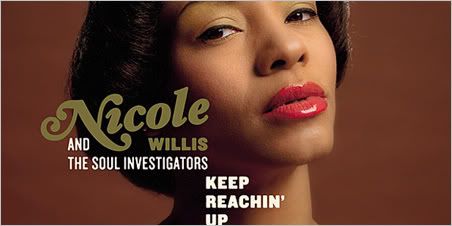
“If This Ain’t Love (Don’t Know What Is)“
from the album Keep Reachin’ Up
2007
iTunes
It’s impossible to listen to Keep Reachin’ Up by Nicole Willis and the Soul Investigators without wanting to move in the kind of way that involves phrases like hip swagger and soul strut. It harkens back to Brooklyn in the ’70s, or soul songs with the guileless rhythm found in a Quentin Tarantino movie, the soundtrack featuring a diva — an Aretha/James Brown hybrid — who promptly breaks through to the foreground, bringing along a horn section and calm confidence.
Keep Reachin’ Up is the newest release from reissue-loving Seattle label Light in the Attic. But Keep Reachin’ Up is a new classic, not a reissue. The neo-soul songsmith’s record — an album-length cherry-pick from soul and funk greats — was originally released on the Timmion label in late 2005, and is only now getting a stateside release thanks to LITA’s distribution relationship with the Finnish label.
An unself-conscious, Tarantino-evoking sound emanating from Finland circa 2005? What planet is Nicole Willis from? Whatever it’s called, it’s got Ritalin in the water by the gallon.
A lesson in productivity, Willis is a full-time art student at the Lahti Art Institute and the mother of a 4-year-old and a 5-year-old. She counts her husband, Finnish techno cabaret star Jimi Tenor (who provided many of the album’s horn arrangements), as a great influence in her work ethic. Shortly after meeting him, they recorded the bulk of her first album, 2000’s Soul Makeover, in five days. “He shows me how things can get done in this way that’s productive and less self-conscious,” she says of the method that marked a 180-degree departure from when she would spend the better part of a year in the studio making albums. “You spend top dollar that way, too.”
To record her new album, ex-pat Willis stepped back from Lahti — where she’s lived for the past several years — and zoomed into the time when music became the gathering medium of choice for her family in ’70s Brooklyn.
“We had this portable turntable with speakers in it. We used to listen to music on that — most of the time it was our parents’ old 45s,” says the 43-year-old. “It wasn’t the stuff that was on the radio. We used to do dances or ask our dad, ‘Show us the dance you used to do to this song!’ We used to have competitions to sing — my brother did a really good impersonation of James Brown. I did a really good impression of Al Green. Music was always a part of enjoying being together as the family.”
Celebrating and making music with others is still a part of Willis’ M.O. — she’s backed by the Finnish ensemble the Soul Investigators. With the 10 of them on different schedules in various jobs and her at art school with two kids, writing wasn’t executed as efficiently as it was for her debut. But in order to hone in on the music she wanted to write, she used a secret weapon most neo-soul artists wish they had: “When I was writing some of the words, I made a couple of phone calls to my dad and asked, ‘What are some of the dances you used to do?’ I wanted to capture that feeling.”
To get that feeling of dancing in Brooklyn in the late ’50s, just envision dances like the Madison, a line dance that’s just as communal as it is unscripted, both free-form and clean. “When people go out to clubs now, they have to draw attention to themselves in such a way, they don’t look like they’re enjoying themselves.”
The aesthetic of Keep Reachin’ Up — its graceful sensuality and throwback to, gulp, subtlety — comes straight from what Willis finds missing in music today. She’s the anti–Amy Winehouse because of those roots, that history. There are songs on here that recall mid-’60s Brook Benton (“A Perfect Kind of Love”); others, like opener “Feelin’ Free,” are lush and funky, like most early ’70s soul. Standout “If This Ain’t Love (Don’t Know What Is)” manages to encapsulate almost every era of R&B to evoke a genre all Willis’ own.
“They could tone it down,” she says of the older artists. “[Today’s pop stars] are vulgar in a way. People don’t hide anything. Everybody has their clothes off, walking around with their bits hanging out, cameras on the ass. It’s not trying to be subtle in any way.”
Willis isn’t trying to be soulful or subtle. She just is.


